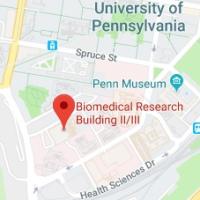Katherine L. Nathanson, MD
 Principal Investigator
Principal Investigator
Pearl Basser Professor of BRCA-related Research, Perelman School of Medicine
Director, Penn Medicine Center for Genomic Medicine
Deputy Director, Abramson Cancer Center
University of Pennsylvania
Recruiting
We are always looking for qualified and enthusiastic applicants interested in joining our lab. In particular, individuals seeking opportunities at the postdoctoral level are encouraged to apply. Please click here for the details.
Lab in the News
Announcing the Penn Medicine Center for Genomic Medicine
February 29, 2024
We are delighted to announce the establishment of the Penn Medicine Center for Genomic Medicine (PMGM) led by Katherine L. Nathanson, MD, as Director, with Danielle McKenna, MS, CGC, as Deputy Director, and Sony Tuteja, PharmD, as Director of Pharmacogenomics.
Penn Medicine is a national leader in genomic medicine, in which genetic and genomic information about an individual is utilized to inform their medical management. In particular, Penn Medicine has been an innovator in the integration of genomic medicine in our electronic health record (EHR), PennChart. The number of indications for genetic testing, as well as conditions for which genetic testing guides medical management, has exponentially increased over the past few years. The PMGM aims to support and enhance the growth of genomic and genetic informed clinical care to build upon our existing strengths in this area, improve coordination across the many existing programs utilizing genetics and genomics to inform clinical care, and ensure all patients across UPHS have equitable access to benefits from advances in genomic medicine. The PMGM also seeks to speed bench-to-bedside translational research in genomic medicine, leveraging discoveries made at Penn Medicine, and will work to broaden education in genomic medicine and unify the adoption of new technology and testing across the entirety of UPHS.
About Dr. Katherine Nathanson, Director
Dr. Nathanson is an internationally-recognized geneticist and we are thrilled that she has agreed to lead the PMGM. She currently serves as Deputy Director of the Abramson Cancer Center, Pearl Basser Professor for BRCA-Related Research at the Abramson Cancer Center, Director of Genetics for the Basser Center for BRCA, and Professor of Medicine in Genetics. Her clinical and research expertise is in cancer genetics/genomics.
Dr. Nathanson’s research focuses on both inherited susceptibility to cancer and somatic genetic characterization of tumors, with interests across multiple tumor types, including testicular germ cell tumors, hereditary breast and ovarian cancers, melanoma and neuroendocrine tumors. She has led multiple studies elucidating the genetic underpinnings of hereditary breast and ovarian cancer and the seminal studies elucidating genetic variation leading to testicular cancer susceptibility and the underlying disrupted pathways, as the leader of the Testicular Cancer Consortium (TECAC). Most recently, Dr. Nathanson has spearheaded the aforementioned integration of genomic medicine into PennChart.
To learn more about Dr. Nathanson’s impressive career, visit this web page to read about her published work, awards, and extensive record of national service.
Penn Study Illuminates Why Cancers Caused by BRCA Mutations Recur
November 10, 2022
PHILADELPHIA -- Researchers at the University of Pennsylvania’s Basser Center for BRCA at the Abramson Cancer Center have discovered factors that may make breast and ovarian cancers associated with BRCA1/2 gene mutations more likely to recur. These mutations strongly predispose women to breast and ovarian cancers, and these cancers have a high risk of recurrence after initial treatment. In the new study, published this week in Nature Communications, the researchers compared a large set of tumors from patients with primary and recurrent BRCA1/2 mutation-associated breast and ovarian cancers, and found multiple features associated with recurrence, including features that would be expected to improve tumors’ ability to repair treatment-caused DNA damage.
Penn Medicine Researchers Receive $5.4 million Grant to Find Genetic Drivers of Testicular Cancer
October 28, 2020
The international hunt to find more genetic risk markers for testicular cancer is expanding. A team of researchers led by Katherine L. Nathanson, MD, deputy director of the Abramson Cancer Center and the Pearl Basser Professor for BRCA-Related Research in the Perelman School of Medicine at the University of Pennsylvania, was recently awarded $5.4 million over five years from the National Institutes of Health to continue the long-standing genomics work of the TEsticular CAncer Consortium (TECAC).
Projects Awarded Cancer Moonshot Funding to Address Inherited Cancer Syndromes
September, 2019
The project "Randomized trial of universal vs. guideline-directed germline testing among young adults with cancer" was awarded through the Cancer Moonshot Funding mechanism.
Deputy Director of Penn’s Abramson Cancer Center Receives $3 Million Grant from The Gray Foundation
July 24, 2019
PHILADELPHIA – Katherine L. Nathanson, MD, deputy director of the Abramson Cancer Center at the University of Pennsylvania and the Pearl Basser Professor for BRCA-Related Research in Penn’s Perelman School of Medicine, has been awarded a $3 million research grant from the Gray Foundation. This new Team Science Grant, titled the "Determinants of immune activity and molecular features in BRCA1/2 mutation carriers," will support Nathanson and her team as they study new approaches to understanding immune function both in healthy BRCA mutation carriers and BRCA-related cancers.
Katherine L. Nathanson, MD, Named Inaugural Pearl Basser Professor for BRCA-Related Research – PR News
April 12, 2019
A new gift to support the Basser Center for BRCA at the University of Pennsylvania’s Abramson Cancer Center (ACC) established and endowed the Pearl Basser Professorship for BRCA-Related Research. Katherine L. Nathanson, MD, deputy director of the Abramson Cancer Center and director of genetics at the Basser Center, has been appointed the inaugural chair holder.
NatureRevClinOncol: Association of Inherited Pathogenic Variants in Checkpoint Kinase 2 (CHEK2) With Susceptibility to Testicular Germ Cell Tumors
Jan 31, 2019
Inherited CHEK2 mutations are high-risk drivers of susceptibility to testicular germ cell tumours and might be informative for the clinical cancer-risk management of mutation carriers and their at-risk family members: https://jamanetwork.com/journals/jamaoncology/fullarticle/2722624 …
Beyond BRCA: Examining Links between Breast Cancer, Second Primary Cancer and Inherited Genetic Mutations
May 31, 2018
The study from the Basser Center for BRCA in the Abramson Cancer Center of the University of Pennsylvania also investigated the use of polygenic risk scores – which have recently been added to some commercial clinical multiplex genetic testing panels. Kara N. Maxwell, MD, PhD, an instructor of Hematology-Oncology and the study’s lead author, will present the findings at the 2018 American Society of Clinical Oncology Annual Meeting in Chicago (Abstract #1503). The team – led by Susan M. Domchek, MD, executive director of the Basser Center for BRCA, and Katherine L. Nathanson, MD, deputy director of the Abramson Cancer Center, specifically looked at patients who did not have a BRCA1/2 mutation and tested them for a panel of 15 different genetic mutations.
Penn Study Finds Relationship between PTEN Loss, Potential for Immune Response in BRCA 1/2-Deficient Ovarian Cancer
April 13, 2018
“PTEN is a genomic marker we already routinely measure, and based on published data we wanted to know if we could use it to predict which BRCA1/2 mutated tumors are likely to respond to checkpoint inhibitors and which are not,” said the study’s senior author Katherine L. Nathanson, MD, deputy director of the Abramson Cancer Center and director of Genetics at the Basser Center for BRCA.
Retention of One Normal Version of BRCA Gene in Breast and Ovarian Cancers Influences Patient Survival, According to Penn-led Study
August 22, 2017
There are many reasons patients may be resistant to treatment — the immune system, the complex landscape of a tumor, or a patient’s own genes can all play a role. Without explicitly looking for it, the Penn team found another mechanism of resistance to a standard treatment for patients with BRCA-associated cancers. “Our primary question was not aimed at evaluating resistance to therapy, but we did end up there,” said senior author Katherine Nathanson, MD, deputy director of the Abramson Cancer Center, and director of Genetics at the Basser Center for BRCA.
Study Sheds New Light on Inherited Testicular Cancer Risk
June 12, 2017
An analysis of data from five major studies of testicular cancer has identified new genetic locations that could be susceptible to inherited testicular germ cell tumors. The findings, which researchers call a success story for genome mapping, could help doctors understand which men are at the highest risk of developing the disease and signal them to screen those patients. Researchers from The international TEsticular CAncer Consortium (TECAC), led by Katherine L. Nathanson, MD, a professor of Translational Medicine and Human Genetics at the Perelman School of Medicine at the University of Pennsylvania and a member of Penn’s Abramson Cancer Center, worked with multiple institutions to perform the analysis. The findings were published today in Nature Genetics.
In-depth Gene Search Reveals New Mutations, Drug Targets in Rare Adrenal Tumors
February 13, 2017
Analyzing genetic data of 173 patients from The Cancer Genome Atlas, researchers, including senior author Katherine Nathanson, MD, a professor in the division of Translational Medicine and Human Genetics at the Perelman School of Medicine at the University of Pennsylvania and associate director for Population Science at Penn’s Abramson Cancer Center, identified CSDE1 and fusion genes in MAML3 as drivers of the disease, both a first for any cancer type. The researchers also classified PCC/PGL into four distinct subtypes, each driven by mutations in distinct biological pathways, two of which are novel.





